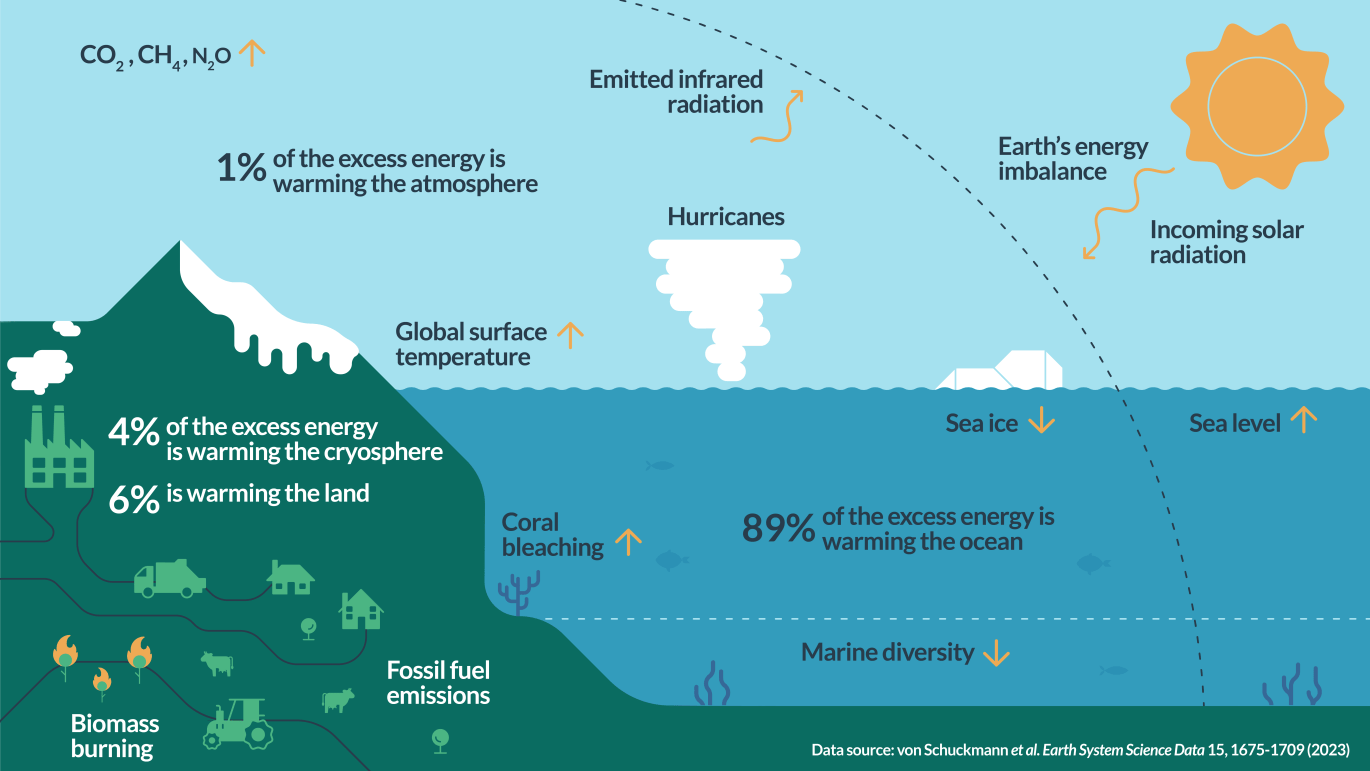The Court Has Spoken. The Ocean Finally Has a Voice.
International Court of Justice has declared that climate inaction violates international law. This could reshape ocean protection for decades to come.
When a coral reef dies, who speaks for it in court?
This week, the ocean got its first answer.
On 23 July 2025, the International Court of Justice (ICJ) issued a unanimous advisory opinion on climate change. It confirmed what many have argued for decades: failing to act on climate is not just morally negligent. It is a violation of international law.
This case did not arise from the world’s biggest polluters. It began with Vanuatu, a Pacific island nation on the frontlines of sea level rise, saltwater intrusion and disappearing reefs. The populations are facing a natural resource crisis with freshwater sources becoming increasingly scarce, and water salinization is a growing problem.
In 2023, Vanuatu led a global coalition of mostly small island states and youth climate activists to bring this legal question to the UN General Assembly. Their message was simple, the climate crisis is not just a political failure. It is a human rights emergency and an ocean emergency. By pushing the world’s highest court to respond, Vanuatu gave the ocean a voice, and made clear that those already living with the consequences of inaction will no longer settle for silence.

Their struggle reminds us that climate change isn’t just about carbon or coastlines. It’s about the right to exist, to live safely, to breathe clean air, to drink clean water, and to depend on the ocean without fear.
SO, after the ICJ’s announcement, those of us fighting to protect what’s left, it felt like the tide had finally turned, not in science, but in law.
The court stated that countries have binding legal obligations to address climate change. These obligations extend to the systems the ocean holds together, currents, coastlines, coral reefs, krill, and everything in between. What happens in the ocean now has legal weight. What governments fail to prevent may now come with consequences.
This ruling is not just about carbon or courtrooms. It is about justice. It recognises that when the ocean suffers, so do people. Silence and delay are no longer defensible.
Climate inaction is now a legal violation
The ICJ was asked by the UN General Assembly to answer two key questions: what are states required to do under international law to protect the climate system, and what happens if they fail?
The Court’s response was firm.
“States have binding obligations to prevent significant environmental harm caused by climate change, including the protection of present and future generations.”
In short, climate inaction can now be considered an internationally wrongful act. Governments may be held legally responsible for damage caused by rising emissions, extreme weather, and ecosystem collapse.
The opinion explains that states must:
Fulfil their commitments under climate agreements such as the Paris Agreement and Kyoto Protocol
Cooperate with other countries, especially those most vulnerable to climate impacts
Regulate private actors, including fossil fuel companies, whose emissions contribute to harm
Protect marine environments as required under the United Nations Convention on the Law of the Sea (UNCLOS)
This last point is critical.
In 2024, the International Tribunal for the Law of the Sea ruled that carbon dioxide emissions qualify as marine pollution under UNCLOS:
“Carbon dioxide emissions from human activity qualify as marine pollution under Part XII of the United Nations Convention on the Law of the Sea (UNCLOS). Therefore, states have a legal obligation to prevent, reduce, and control this pollution.” (ITLOS, May 2024)
That definition is now embedded in the ICJ’s ruling.
Climate law must include the ocean.
The ocean enters the legal conversation
The ocean has always done more than its share. It absorbs about 89% of excess heat in Earth’s climate system. It stores around a third of the carbon dioxide we release. It shapes the climate, feeds the planet, and carries life across currents older than nations.
Until now, the legal system barely acknowledged any of this.
This ruling changes that. The Court confirms that states must now:
Prevent climate-related damage to the ocean, including warming, acidification, sea level rise, and biodiversity loss
Update marine laws and governance to reflect accelerating climate risks
Regulate high-emission activities — such as offshore oil and gas — that contribute to marine degradation
Cooperate across borders to protect marine ecosystems and support vulnerable states
This is a turning point.
The ocean is no longer treated as a passive victim. It is now a legally protected system. States are not just encouraged to act. They are obligated to do so.
Responsibility now has consequences
The Court also explained what happens when states fail to meet their obligations.
They may be required to:
Pay compensation to countries or communities harmed by climate impacts
Restore what was lost, where possible
Commit to meaningful change, to prevent future harm
This ruling allows for shared responsibility. When multiple states contribute to the same harm — such as ocean warming, coral bleaching, or fishery collapse — they can all be held accountable. This includes emissions from private companies operating within their borders.
Cumulative emissions can establish liability if a “sufficiently direct and certain causal connection” to climate-related harm can be demonstrated. The Court clarified that a state may still be responsible even when the damage is caused by global emissions over time.
This matters for countries facing saltwater intrusion, disappearing reefs, collapsing fish stocks, and rising seas. They no longer have to prove which polluter is to blame. They only have to show the link.
The Court also emphasised that countries with greater historical responsibility for emissions bear stronger obligations. This reflects what frontline nations have argued for years, that climate justice must account for legacy pollution and past inaction.
A legal win for future generations
The ICJ made one thing unambiguous: states have duties to protect future generations.
This carries particular weight in ocean law. Marine impacts unfold slowly. Warming waters today will reshape ecosystems for decades. A whale born now may live into the next century. Coral regrowth takes lifetimes. Plastic and acidification may outlast us all.
Previously, legal systems struggled to recognise these long-term harms. This ruling makes them visible. It affirms that legal protection extends beyond the living. Governments are responsible not just for their citizens, but for their descendants.
This is not just law. It is ethics, written into obligation.
What this means for ocean campaigns
This ruling gives new power to marine conservationists, climate litigators, and frontline nations. It provides:
A legal foundation to challenge deep-sea mining, offshore drilling, and destructive fishing
A basis for island nations to seek compensation for sea level rise and marine ecosystem collapse
A mandate to include the ocean in climate adaptation and mitigation plans
A stronger framework to direct climate finance toward marine protection
This is also a boost for Sustainable Development Goal 14 (Life Below Water). It reinforces the goal not as a voluntary aspiration but as a legal responsibility.
This ruling is not just for lawyers. It is for everyone trying to hold the line at sea level.
One important note
ICJ advisory opinions are not directly enforceable. They do not carry penalties or trigger legal action on their own. However, they shape how future treaties are written, how national courts decide climate cases, and how legal arguments are made in future litigation.
This ruling will be cited for decades. It sets a global legal precedent. It closes the gap between what science has long shown and what law now demands.
The ocean is no longer a passive witness
This ruling will not refreeze the Arctic or undo the centuries of heat stored below the surface. It will not bring back extinct reefs.
What it does is rewrite the legal narrative.
It confirms that the damage we do to marine life is no longer just ecological. It is unlawful.
It affirms that the ocean is not invisible in legal frameworks. It is part of the climate system that states are required to protect. It has standing in the eyes of international law.
The ocean has always absorbed excess. Our heat. Our carbon. Our neglect. This week, for the first time, it absorbed something else. Justice.
The law now speaks for the sea.
If this story moved you, if it made you see the ocean, the law, or climate justice in a new way, then share/restack it.
And if you want more reporting like this, grounded in science, strategy and storytelling, hit subscribe. Ocean Rising is built to inform, provoke, and push for change. The more of us who read, share, and act, the louder the ocean’s voice becomes.






Finally some good news! I really enjoyed reading your piece, thanks!